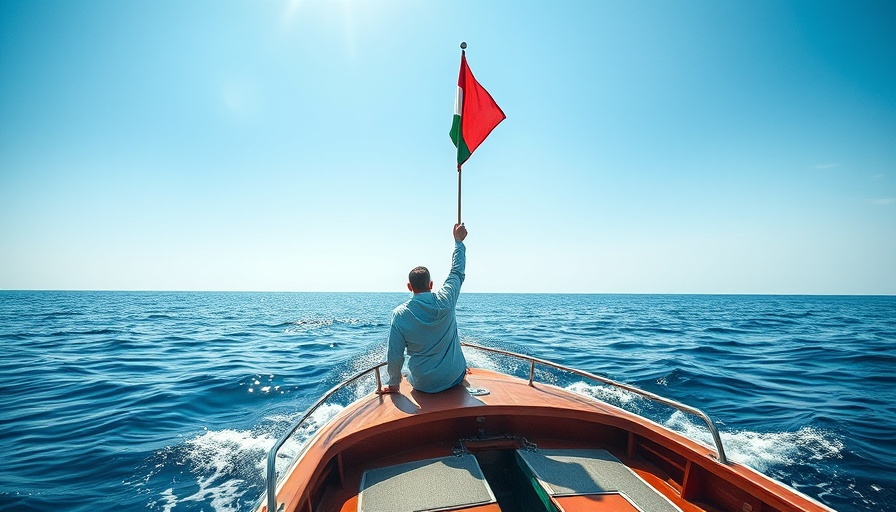
Israeli Forces Intercept Gaza-Bound Aid Boat: A Bold Humanitarian Mission
In a dramatic turn of events, Israeli forces have intercepted an aid boat bound for Gaza, detaining well-known climate activist Greta Thunberg and several others from the Freedom Flotilla Coalition. The Madleen boat, which set sail from the Sicilian port of Catania, Italy on June 1, 2025, aimed to bring humanitarian aid to Palestinians living in distressing conditions due to ongoing conflict and blockades. This incident has not only brought global attention to the situation in Gaza but has also sparked vigorous discussions around humanitarian efforts and political stances in the region.
Aiming for Change: The Role of Activism in Global Awareness
Activism plays a pivotal role in advancing social consciousness and domestic policies. Greta Thunberg, renowned for her climate advocacy, turned her attention to the humanitarian crisis in Gaza, highlighting the intersectionality of environmentalism and human rights. By aligning her influence with this humanitarian mission, she brings to light a powerful narrative that advocates for marginalized communities affected by geopolitical tensions. This move may change public perception, pushing the broader conversation around climate issues to include the humanitarian crises exacerbated by environmental policies or the lack thereof.
The Implications of Global Humanitarian Efforts in Conflict Zones
This incident isn’t just about an aid boat—it symbolizes a larger struggle regarding how humanitarian efforts are perceived and executed in volatile regions like Gaza. Critics of Israel's interception assert that such actions hinder international aid and exacerbate the suffering of innocent civilians. However, proponents argue that security measures are necessary in conflict zones to ensure safety. These contrasting views highlight the complexities of international relations and the ethical dilemmas activists face.
Building Emotional Connections: The Human Cost of Conflict
The emotional weight of this situation cannot be understated. Every day, countless individuals in Gaza endure hardships caused by compounded factors such as political strife, economic sanctions, and social injustice. The presence of prominent figures like Thunberg amplifies the cries for help, potentially rallying more global support. It’s crucial to remember that while political disputes garner headlines, the human life behind the conflict is what truly needs addressing.
Public Response: A Wave of Support on Social Media
The news of Thunberg's detention has sparked widespread reactions across social media platforms, where the discourse has become a trending topic in the world today. Many are expressing solidarity with the activists aboard the Madleen and condemning the Israeli authorities' actions. The hashtag #FreeTheFlotilla has gained traction, emphasizing the impact of digital platforms in mobilizing public sentiment and highlighting the urgency of humanitarian missions.
Challenges and Risks: The Dangers of Humanitarian Assistance in Conflict Areas
Engaging in humanitarian assistance in conflict areas like Gaza presents significant risks. Activists, as well as the aid they are delivering, face the potential of violence and political backlash. Learning from past incidents where humanitarian missions have been halted or attacked, it is vital to create a framework that prioritizes safety while advocating for freedom of humanitarian initiatives. For future missions, improved planning and communication can help enhance the protection of those involved.
Looking Ahead: What the Future Holds for Humanitarian Krews
As discussions continue post-incident, the actions of the activists could lead to a more unified front regarding international humanitarian laws and norms. With rising global awareness surrounding humanitarian efforts, the future could involve enhanced advocacy for safe passages for aid workers, more robust international protections for activists, and potentially broader cooperation between nations focused on humanitarian laws.
The implications of Thunberg and the activists’ commitment to the Palestinian cause serve as a rallying cry for future efforts. This engagement can potentially shift discourse and pressure governments worldwide, creating a climate where humanitarian support is prioritized over political barriers. In this rapidly shifting landscape, it’s essential for supporters to stay informed, challenge norms, and recognize the value of humanitarian work both on-site and online.
As we move forward, it will be interesting to see how this incident influences not only ongoing humanitarian missions but also the way social movements intertwine with political advocacy across various domains.
 Add Row
Add Row  Add
Add 




 Add Row
Add Row  Add
Add 

Write A Comment